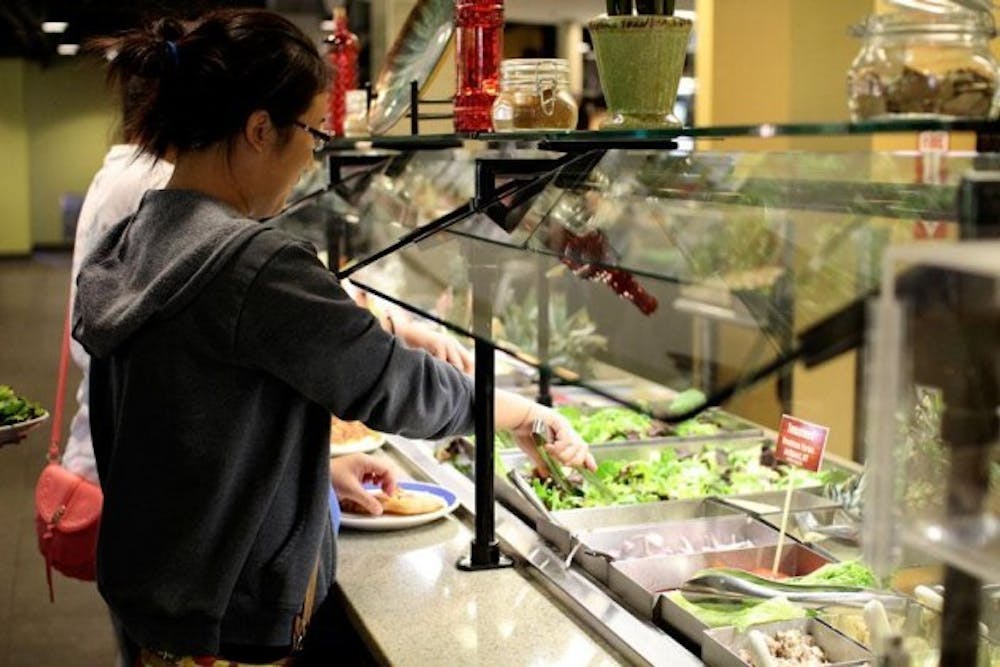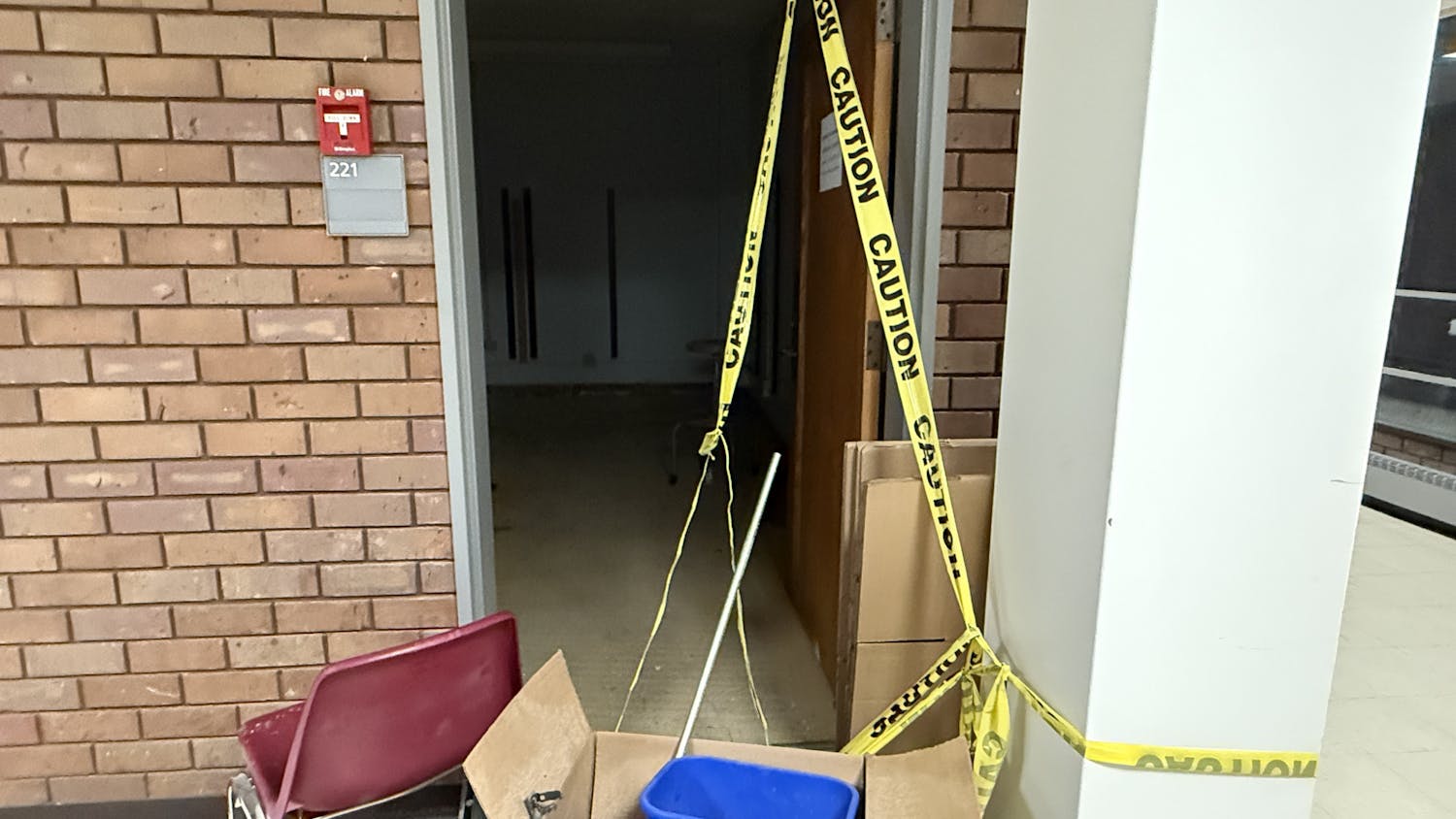Five years ago, Jeff Brady, the executive director of Campus Dining & Shops (CDS), began seeing a trend in Western New York. He noticed people were increasingly trying to buy locally grown products.
Brady knew he needed to make changes to his organization.
Since then, CDS has taken strides to embrace this trend and become more environmentally conscious. To Brady, the two go hand in hand. Although these changes aren't always cost-effective, Brady believes it is what the students want and is essential in bettering the local community and the global environment.
Brady believes buying local goods is not about the cost; it is an investment in Western New York. CDS spends about $3.1 million each year on local products. Most companies consider local products anything within a 500-mile radius, Brady said. CDS, however, defines "local" as anything within 100 miles.
"Some of these things may be costly, but it is the right thing to do," Brady said. "We are constantly working on things throughout the organization to make it a better place. We are very conscious about the carbon footprint we put on campus. We are always working on something."
CDS has been privately contracted by UB for the past 51 years and currently has 32 operations throughout the campus. Brady said the main goal of the organization is to keep the stakeholders - primarily students - happy with its service.
By keeping the money circulating in Western New York, CDS is helping local farmers and purveyors stay employed and stimulating the local economy, said Ray Kohl, marketing manager for CDS.
Kohl said not only is it good business sense, but it is also a way to give students the freshest food.
"I think our overall stance as a company is we want the best possible product for our customers," Kohl said. "And if we can do that locally and make it, still, cost effective to some degree, then it just makes sense."
This initiative extends to locally made foods and products as well.
Rich Products Corporation, a company headquartered in Buffalo, provides CDS with all of its pizza dough and breadsticks. The Upstate Farms Cooperative, located in Niagara Falls, N.Y., produces all of the milk, yogurt and cream CDS uses.
Brady said he even tries to get non-food products from manufacturers that are local or at least in state. All of the plate ware in the new Crossroads Culinary Center (C3), the dining hall in the Ellicott Complex that opened in the fall 2012 semester, was made at Niagara Ceramics. The company made seven different designs for the center for $60,000. Liberty Tabletop, located in state as well, manufactured all of the silverware.
"We could go to a national company and buy it cheaper, but we would much rather buy here in Western New York and keep the people gainfully employed," Brady said.
Brady stressed the importance of the trend, especially in terms of produce. CDS contracts a lot of local farms - including Goodman Farms, Eden Valley Cooperative and Freatman Farms - all of which are within 36 miles of North Campus.
Dave Walczak, operations manager at Eden Valley, noticed the trend has increased business. He said even in the offseason, people have asked about buying the farm's produce.
"It's nice to know that the product we are growing is staying in my backyard," Walczak said. "It does well for everyone."
Brady said buying local goods plays a big part in being sustainable and eco-friendly. One big factor in this relationship is the carbon emissions from cross-country shipping. Buying locally cuts down the pollution from trucking immensely, he said.
Kohl agrees. He said CDS goes one step further and tries to work with companies that use trucks that run on biodiesel fuel. He added CDS tries to limit the number of trips trucks have to take to campus to lower the emissions. He said he and Brady are constantly looking for new ways to be energy efficient.
"We're always thinking about things like that - how can we operate more efficiently and reduce our carbon footprint at the same time?" Kohl said. "It is a large part of the campus that we impact, so [we ask ourselves] what can we do to minimize that impact?"
Brady said over that past few years, more students have shown an interest in becoming more sustainable and eco-friendly, so that issue immediately became important to CDS.
Jonathan Gibbons, a senior environmental geosciences major, thinks it'srefreshing to see the people at CDS as passionate about these issues as he is. Other students agree.
"I think the view on sustainability of a lot of people is, 'Why bother? What difference can I make?'" said Kristen Janson, a senior environmental studies major. "It is really encouraging that CDS - even if it's not cost effective - is making an effort to be sustainable because it is important to us."
Three years ago, CDS started an initiative to eliminate Styrofoam from campus because removing it is environmentally friendly. Now, CDS doesn't use any Styrofoam in any of its operations, even though the paper substitute is about five times more expensive.
CDS has a contract with Pepsi as its beverage provider. As part of the contract, Brady noticed Pepsi didn't have a sustainable cup and one that didn't break down well in a landfill. He and Pepsi worked with Solo to create a biodegradable cup made specifically for UB.
Brady started an initiative last year that takes all the waste from various CDS operations and puts it through a process to make soil amendment. The compost and other organic additives improve the quality of the soil and give plants more nutrients than they would receive otherwise. CDS packages the amendment and sends it back to local farms.
The little steps can make a big difference, Brady said. And he is always looking to improve. He tried to change the lighting CDS uses to LED lighting, which is more energy efficient. He also invested in more environmentally friendly trucks and cars for CDS to use on campus. CDS even added 10 "reverse vending machines," which give students 5 cents for each deposited plastic bottle, which print a receipt that can be redeemed on campus.
Brady and Kohl said they are still committed to making CDS more sustainable and are continuing to look for local organizations with which CDS can do business. But for now, they are excited about CDS' direction.
Email: news@ubspectrum.com





